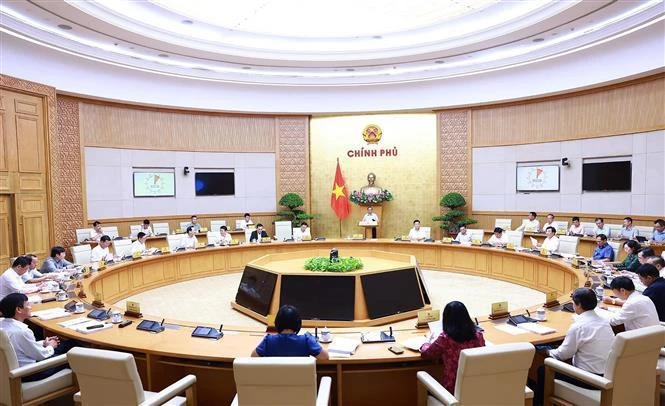 |
| An overview of Government monthly law-making session (Photo: VNA) |
The session discussed three draft laws, three proposals for law-making, and one report content, including the draft law on amendments and supplements to several articles of the Law on Vietnamese People's Army Officers; the draft Ordinance on Management and Protection of the Ho Chi Minh Mausoleum Historical Site; the proposal to build the Public Investment Law (amended); and the proposal to build the Law on amendments and supplements to some articles of the Law on Planning, Law on Investment, Law on Public-Private Partnership Investment, and Law on Bidding.
The proposal to build the law on amendments and supplements to some articles of the Law on State Budget, Law on Management and Use of Public Assets, Law on National Reserves, Law on Accounting, Law on Independent Auditing, Law on Securities, and Law on Tax Administration; the draft Law on Corporate Income Tax (revised); and the Draft Law on Special Consumption Tax (revised) were also put on table.
In addition, the Government provided opinions on the transfer of Vocational College No. 1, Vocational College No. 4, and Vocational College No. 20 under the Ministry of Defence to be under the management of the Ministry of Labour, Invalids, and Social Affairs.
PM Chinh required ministers to seriously acquire feedback, continue consulting with experts and scientists, and collaborate effectively with relevant ministries, sectors, and agencies during the drafting and finalisation of these legislative documents.
Stating that at the upcoming eighth plenary session of the 15th National Assembly, the Government will submit to it for comments on 11 draft laws, and consideration and approval of 14 others, Chinh stressed the task is very heavy, requiring ministers and heads of ministerial-level agencies to focus resources, and direct the completion of these draft laws in accordance with the provisions of the Law on Promulgation of Legal Documents.
The Government leader emphasised that the process of building and finalising draft laws and ordinances must ensure thorough decentralisation; effectively mobilise and allocate resources; design tools to enhance oversight, monitoring, and control of power; streamline and simplify administrative procedures to reduce costs for businesses and improve the investment and business environment; and prevent the inclusion of regulations that favour specific interest groups, or create opportunities for corruption and negative phenomena.
He asked ministries and agencies to coordinate closely and effectively with the National Assembly's agencies in presenting, reviewing, and acquiring, and clarifying the legislature's and its members' opinions. They should also enhance policy communication to build high consensus, and build and issue detailed documents guiding the implementation of laws and ordinances, so as to ensure the coherence and consistency of the legal system./.